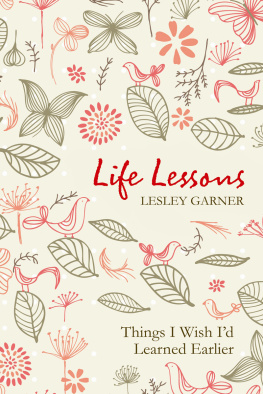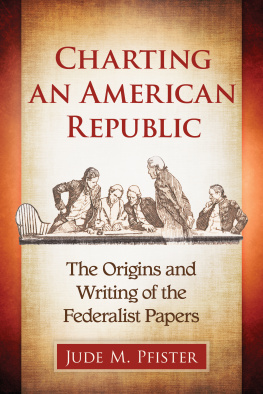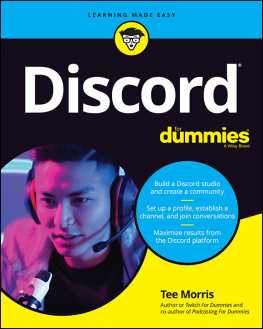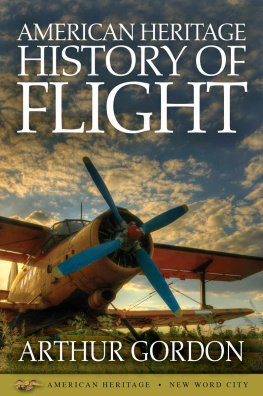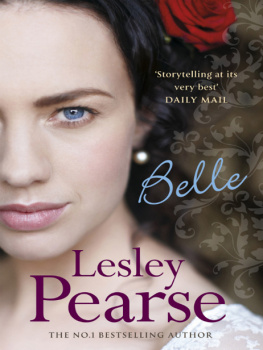Lesley J. Gordon - American Discord: The Republic and Its People in the Civil War Era
Here you can read online Lesley J. Gordon - American Discord: The Republic and Its People in the Civil War Era full text of the book (entire story) in english for free. Download pdf and epub, get meaning, cover and reviews about this ebook. year: 2020, publisher: LSU Press, genre: Politics. Description of the work, (preface) as well as reviews are available. Best literature library LitArk.com created for fans of good reading and offers a wide selection of genres:
Romance novel
Science fiction
Adventure
Detective
Science
History
Home and family
Prose
Art
Politics
Computer
Non-fiction
Religion
Business
Children
Humor
Choose a favorite category and find really read worthwhile books. Enjoy immersion in the world of imagination, feel the emotions of the characters or learn something new for yourself, make an fascinating discovery.

- Book:American Discord: The Republic and Its People in the Civil War Era
- Author:
- Publisher:LSU Press
- Genre:
- Year:2020
- Rating:5 / 5
- Favourites:Add to favourites
- Your mark:
- 100
- 1
- 2
- 3
- 4
- 5
American Discord: The Republic and Its People in the Civil War Era: summary, description and annotation
We offer to read an annotation, description, summary or preface (depends on what the author of the book "American Discord: The Republic and Its People in the Civil War Era" wrote himself). If you haven't found the necessary information about the book — write in the comments, we will try to find it.
American Discord: The Republic and Its People in the Civil War Era — read online for free the complete book (whole text) full work
Below is the text of the book, divided by pages. System saving the place of the last page read, allows you to conveniently read the book "American Discord: The Republic and Its People in the Civil War Era" online for free, without having to search again every time where you left off. Put a bookmark, and you can go to the page where you finished reading at any time.
Font size:
Interval:
Bookmark:
AMERICAN DISCORD
Conflicting Worlds: New Dimensions of the American Civil War
T. Michael Parrish, Series Editor
AMERICAN DISCORD
THE REPUBLIC AND ITS PEOPLE IN THE CIVIL WAR ERA
EDITED BY MEGAN L. BEVER LESLEY J. GORDON AND LAURA MAMMINA

Louisiana State University Press
Baton Rouge
Published with the assistance of the University of Alabamas Charles G. Summersell Chair of Southern History and the Frances J. Summersell Center for the Study of the South.
Published by Louisiana State University Press
Copyright 2020 by Louisiana State University Press
All rights reserved
Designer: Michelle A. Neustrom
Typeface: Sentinel
Christian Paternalism and Racial Violence: White and Black Baptists in Texas during the Civil War Era, by T. Michael Parrish, first appeared, in different form, in Texas Baptist History (2015), and is published here with the permission of the Texas Baptist Historical Society.
Portions of Newspaper Advertisements and American Political Culture, 18641865 first appeared in chapter 3 of Marketing the Blue and Gray: Newspaper Advertising and the American Civil War, by Lawrence A. Krieser Jr., and are used by permission of the publisher.
Portions of Fires at the Battles of Chancellorsville and the Wilderness first appeared in chapter 3 of The Battle of the Wilderness in Myth and Memory: Reconsidering Virginias Most Notorious Civil War Battlefield, by Adam H. Petty, and are used by permission of the publisher.
Library of Congress Cataloging - in - Publication Data
Names: Bever, Megan L. (Megan Leigh), 1984 editor. | Gordon, Lesley J. (Lesley Jill), editor. | Mammina, Laura, editor.
Title: American discord : the Republic and its people in the Civil War era / edited by Megan L. Bever, Lesley J. Gordon, and Laura Mammina.
Description: Baton Rouge : Louisiana State University Press, [2020] | Series: Conflicting worlds: new dimensions of the American Civil War | Includes index.
Identifiers: LCCN 2019041538 (print) | LCCN 2019041539 (ebook) | ISBN 978-0-8071-6969-8 (cloth) | ISBN 978-0-8071-7374-9 (pdf) | ISBN 978-0-8071-7373-2 (epub)
Subjects: LCSH: United StatesHistoryCivil War, 18611865Social aspects. | United StatesHistoryCivil War, 18611865Influence.
Classification: LCC E468.9 .A465 2020 (print) | LCC E468.9 (ebook) | DDC 973.7/1dc23
LC record available at https://lccn.loc.gov/2019041538
LC ebook record available at https://lccn.loc.gov/2019041539
The paper in this book meets the guidelines for permanence and durability of the Committee on Production Guidelines for Book Longevity of the Council on Library Resources. 
CONTENTS
, by Gary W. Gallagher
MEGAN L. BEVER
GLENN DAVID BRASHER
LAWRENCE A. KREISER JR.
CHRISTIAN M c WHIRTER
RACHEL K. DEALE
LINDSAY RAE PRIVETTE
ADAM H. PETTY
A. WILSON GREENE
LAURA MAMMINA
CHARITY RAKESTRAW AND KRISTOPHER A. TETERS
T. MICHAEL PARRISH
DANIEL J. BURGE
T. ROBERT HART
JOHN F. MARSZALEK
KEVIN L. HUGHES
FOREWORD
I was delighted to be asked to contribute a brief foreword to this book honoring George C. Rable. I have known Professor Rable quite well for a number of years and consider him a much - valued friendthough, I hasten to add, our friendship developed after I had formed a very high opinion of his scholarship. That opinion has grown ever more positive over the past twenty - five years.
George Rables first two books But There Was No Peace: The Role of Violence in the Politics of Reconstruction (1984) and Civil Wars: Women and the Crisis of Southern Nationalism (1989)reflected his ability to combine sound research in a wealth of primary materials, sophisticated analysis, and strong literary skills. I used both in courses and found them to be excellent tools to inspire lively and productive debate. I will not dwell on what I consider to be the many virtues of these booksboth of which anticipated major shifts in the fieldbeyond stating that my admiration for them prompted me to ask Rable to give a lecture in 1993 at a conference devoted to the campaign of Fredericksburg. He subsequently contributed an essay to a collection I edited titled The Fredericksburg Campaign: Decision on the Rappahannock (1995). His piece discussed the ways in which civilians and soldiers in the United States and the Confederacy sought to come to terms with the seemingly senseless slaughter at Fredericksburg.
During the period that involved the conference and book of essays on Fredericksburg, I sought to convince Professor Rable to publish his book - length manuscript, then in progress, on the political culture of the Confederacy in a series I edited. He agreed, and The Confederate Republic: A Revolution against Politics (1994) more than met my very high expectations. I do not believe any other scholar has treated this subject more deftly or with a better command of the sources, and the book soon became, and has remained, the clear standard on the topic.
Rables next book, Fredericksburg ! Fredericksburg!, also appeared in the series. This pathbreaking study achieved a thorough, and highly unusual, blending of the military and nonmilitary dimensions of a major Civil War campaign. Indeed, Professor Rable remains one of the few scholars who consistently attempts to explore questions within the broadest context of civilian and military influences, and his work on Fredericksburg represents an ambitious effort to examine a military topic within an expansive framework that employs the tools of intellectual, social, political, and military history. Fredericksburg ! Fredericksburg!, a most deserving winner of the 2002 Lincoln Prize, fits squarely within a humanistic tradition, something quite unusual in the genre of battle books. I believe it stands as a model for how such topics should be addressed in the future.
I had the good fortune to work with Professor Rable on a third major project. His prizewinning Gods Almost Chosen Peoples: A Religious History of the American Civil War (2010) added new luster to his already superior reputation. It appeared as the fourth title in The Littlefield History of the Civil War Era, a sixteen - volume series I coedit with T. Michael Parrish. It is remarkable that no academic scholar previously had undertaken a full - blown examination of Civil War religion, and the field of Civil War studies benefited immensely from seeing this glaring void in the literature filled. Based on meticulous research in unpublished materials as well as printed literature, the book combines in pleasing proportion descriptive passages, analysis, and synthesis. It set a very high bar in every way, immediately became the obvious first title to read on the topic (matching The Confederate Republi c in that respect), and surely will inspire a great deal of additional work.
It must be evident that I consider George Rable to be one of the premier scholars in the field of Civil Warera history. He is widely admired and frequently cited by his peers. To a degree highly unusual in our time of narrow specialization, he has made major contributions to the literatures on political, social, womens, military, and religious history of the nineteenth - century United States. He has been consistently productive in a field that offers unusual potential for scholars to reach a lay as well as an academic audience. Professor Rable has made the most of that potential. His many prizes and presidency of the Society of Civil War Historians attest to his reputation among scholars, and the success of Fredericksburg ! Fredericksburg!, which was a selection of the History Book Club, underscores the fact that his writings have found a lay audience.
Next pageFont size:
Interval:
Bookmark:
Similar books «American Discord: The Republic and Its People in the Civil War Era»
Look at similar books to American Discord: The Republic and Its People in the Civil War Era. We have selected literature similar in name and meaning in the hope of providing readers with more options to find new, interesting, not yet read works.
Discussion, reviews of the book American Discord: The Republic and Its People in the Civil War Era and just readers' own opinions. Leave your comments, write what you think about the work, its meaning or the main characters. Specify what exactly you liked and what you didn't like, and why you think so.

